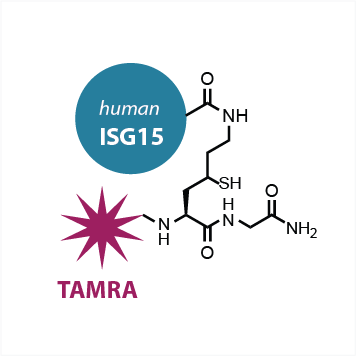
hISG15-FP
a fluorescence polarization assay reagent for deISGylating enzymes, based on a TAMRA modified Lys-Gly sequence, linked to human ISG15
Additional information
| Weight | 0.025 kg |
|---|---|
| aliquot size | |
| Applications | |
| target | |
| source | human sequence, semi-synthetic |
| shipping | |
| purity | >95% |
| molecular weight | |
| storage | |
| sample preparation | For detailed sample preparation, please see product sheet. |
| regulatory statement |
€300.00
- Description
- Additional information
- references
Description
UbiQ-287 is a fluorescence polarization assay reagent for deISGylating enzymes which is based on a 5-carboxytetramethylrhodamine (TAMRA, exc 550 nm, emi 590 nm) modified Lys-Gly sequence that is linked to human ISG15 via a native isopeptide bond.
Additional information
| Weight | 0.025 kg |
|---|---|
| aliquot size | |
| Applications | |
| target | |
| source | human sequence, semi-synthetic |
| shipping | |
| purity | >95% |
| molecular weight | |
| storage | |
| sample preparation | For detailed sample preparation, please see product sheet. |
| regulatory statement |
Tirat, A., et al. Synthesis and characterization of fluorescent ubiquitin derivatives as highly sensitive substrates for the deubiquitinating enzymes UCH-L3 and USP-2. Anal. Biochem. 343, 244-255 (2005).
http://www.ncbi.nlm.nih.gov/pubmed/15963938
Huang, X. & Aulabaugh A. Application of fluorescence polarization in HTS assays. Methods in Molecular Biology 565, 127-143 (2009).
http://www.ncbi.nlm.nih.gov/pubmed/19551360
Levine, L.M., et al. Measurement of specific protease activity utilizing fluorescence polarization. Anal. Biochem. 247, 83-88 (1997).
http://www.ncbi.nlm.nih.gov/pubmed/9126375
Geurink, P.P., et al. A general chemical ligation approach towards isopeptide-linked ubiquitin and ubiquitin-like assay reagents. ChemBiochem 13, 293-297 (2012).
http://www.ncbi.nlm.nih.gov/pubmed/22213387
Basters, A., et al. Molecular characterization of ubiquitin-specific protease 18 reveals substrate specificity for interferon-stimulated gene 15. Febs. J. 281, 1918-1928 (2014).
http://www.ncbi.nlm.nih.gov/pubmed/24533902
